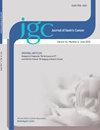胃癌手术后安全出院的决定:增强术后恢复计划的结局。
IF 3.2
4区 医学
Q2 GASTROENTEROLOGY & HEPATOLOGY
引用次数: 0
摘要
本文章由计算机程序翻译,如有差异,请以英文原文为准。
Decision for Safe Discharge After Gastric Cancer Surgery: The Finale of Enhanced Recovery After Surgery Program.
https://jgc-online.org Since the first successful gastrectomy by Theodor Billroth in 1881 [1], surgery has been the main treatment option for gastric cancer, which is one of the main causes of death in the Republic of Korea [2]. Understanding the biology of cancer and anatomy of the stomach and surrounding structures [3], the developed surgical technique and equipment [4], and improved perioperative care [5] help improve the surgical outcomes after gastrectomy for gastric cancer. The related mortality has dramatically decreased from 69% in the 1880s to less than 1% recently [1,6]. The hospital stay has also decreased from 22 days reported in the first cases by Billroth to 7 days in recent cases [6], and the minimally invasive surgery reduced it to even less than 5 days [7]. The enhanced recovery after surgery (ERAS), a multimodal, multidisciplinary approach to surgical treatment, is the center of this improvement.
求助全文
通过发布文献求助,成功后即可免费获取论文全文。
去求助
来源期刊

Journal of Gastric Cancer
Biochemistry, Genetics and Molecular Biology-Cancer Research
CiteScore
4.30
自引率
12.00%
发文量
36
期刊介绍:
The Journal of Gastric Cancer (J Gastric Cancer) is an international peer-reviewed journal. Each issue carries high quality clinical and translational researches on gastric neoplasms. Editorial Board of J Gastric Cancer publishes original articles on pathophysiology, molecular oncology, diagnosis, treatment, and prevention of gastric cancer as well as articles on dietary control and improving the quality of life for gastric cancer patients. J Gastric Cancer includes case reports, review articles, how I do it articles, editorials, and letters to the editor.
 求助内容:
求助内容: 应助结果提醒方式:
应助结果提醒方式:


